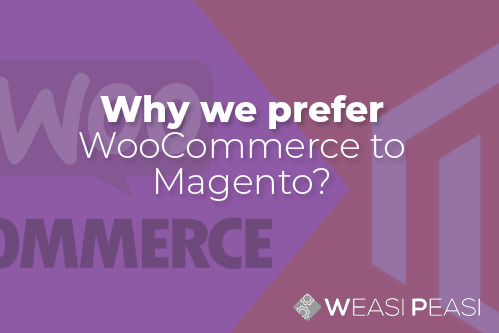WooCommerce and Magento are both leading platfroms when it comes to online stores. But which one is better? Let’s discuss
The potential of creating an eCommerce website as an additional income stream or a proprietary business is undeniable. Just a decade ago, you had to understand front and back-end programming to be able to create a functional online store. Today things are much more straightforward. Combining WordPress with the vast array of plugins available, your web page has never been so accessible. The two most popular ways, and arguably best, to quickly create an eCommerce website are by using WooCommerce and Magento. Both of them have their pros and cons, but we often recommend to our customers the use of WooCommerce over Magento. Why? Let’s discuss!
For the Individual and the Small Business
At its core, WooCommerce is a plugin that is built from the ground up to combine both powerful features and ease of use. Designed for the individual and small businesses in mind, the platform provides you with all the features you’d need to run your eCommerce WordPress website. At the same time, the plugin doesn’t have a steep learning curve. The most experienced WordPress user will utilise WooCommerce in a matter of seconds.
The same can’t be said for Magento. While it can be argued that it is more potent than WooCommerce, Magento is designed with development professionals in mind. The platform targets businesses that aim to develop large online stores.
The Main Differences Between WooCommerce and Magento
To start things off, WooCommerce is a WordPress plugin that is entirely free to use. Magento, on the other hand, while having a community version that is free of charge, also offers several paid services. Of course, WooCommerce can also be costly. Rather than providing its users with paid subscription models, the company instead presents a platform via which developers can create additional (free and paid) plugins. These plugins work within the WooCommerce ecosystem. We primarily consider this a plus, as all the features we are about to discuss come with the free version of the plugin.
The Variety of Choice
While the pricing models of both platforms might be a reason enough for some to choose WooCommerce, this is not the primary driving factor for us. In fact, in most cases, it’s better to allocate specific finances to receive a better option. Doing this keeps the price difference between WooCommerce and Magento even less of a factor.
Where WooCommerce truly shines is the variety of choice. Similarly to how WordPress allows you to choose your hosting, themes and customise it the way you want, WooCommerce does the same. With the plugin, you can select your hosting. Doing this supports almost all WordPress themes and comes with the app above extension system. This system offers hundreds of options from both in-house and third-party developers. In a sense, you can customise WooCommerce pretty much the way you want to.
Magento, while more potent for developers and arguably more secure to online threats, is pretty limited when it comes to choice. Magento offers its premium hosting option. This might be good for more prominent businesses, but is probably not recommended for those who are just starting out. Also, Magento presents you with an array of different themes, but the customizability and variety of choice only can’t be compared with the existing WordPress ecosystem. There are ways to integrate Magento and specific WordPress themes. But the simplicity and ease of use are just not there.
Start Using WooCommerce with Just a Few Clicks
WooCommerce stands out for the ease of use. Magento does require a certain level of web development knowledge, while you can start using the WooCommerce plugin after a brief play with the system. When businesses combine this with the extensive documentation presented by the development team and the fact that you can contact WooCommerce directly with any questions you might have regarding the platform, you have yourself a plugin that is designed for everyone. At the same time, Magento is developed with a more initiated audience in mind. Regular users without any prior web development knowledge might have a pretty hard time managing the platform.
Security, Management and Analytics
People commonly consider Magento as a more secure and coherent platform. Plus, designed with professionals in mind, you have analytics and other management options right out of the box. With WooCommerce, you’d have to rely on plugins and extensions for the analytics. And while the WordPress plugin does have some underlying security, for more advanced safety against online threats you should install additional plugins and extensions as well.
Not “Better,” but rather “Better Suitable.”
To sum things up, there isn’t an option that is better. Both eCommerce platforms are selected correctly within their targeted groups. Each of the options is better suitable for specific individuals and endeavours. If you aspire to build a vast branded store and have the finances at hand, combined with web developers by your side, Magento might be the better choice for you.
But for any other purpose, we would suggest using WooCommerce. Even though we have the development knowledge, we still prefer using WooCommerce due to the variety of choice. Plus, with a few additional tweaks you’d be able to make the platform just as secure and advanced as Magento. Overall, neither platform is better, but rather only better suitable for its respective audience and targeted group.
WooCommerce and Magento are just two example of WordPress plugins. Click here to read about some essential plugins that we recommend!
